A Shepherd Boy and the Wolf: The Echoes of Truth
Reading Time: 11 min
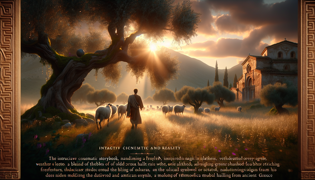
About Story: A Shepherd Boy and the Wolf is a Fable from greece set in the Ancient. This Poetic tale explores themes of Wisdom and is suitable for Children. It offers Moral insights. A classic fable illustrating the consequences of lying.
Introduction
On a serene hillside nestled among ancient olive groves and scattered stone cottages, the first light of dawn broke over a tranquil Greek landscape. Soft rays of gold kissed dew-laden grass while the air vibrated with the songs of early morning birds. Here, in this age-old land steeped in myth and quiet wonder, roamed a young shepherd named Nikolas. With his sandy hair tousled by the gentle wind and eyes alight with dreams larger than the grazing flocks he tended, Nikolas embodied both the innocence of youth and a secret yearning for adventure.
Each day, the rhythmic bleating of lambs and the rustle of olive branches formed a familiar symphony beneath a sky painted in brilliant hues of amber and rose. Nikolas’ world was one of simple routines and age-old rituals, yet his heart beat with the restless curiosity of someone destined for a story far beyond the bucolic village they called home. The small stone homes and ancient columns whispered tales of gods and heroes, encouraging his imagination to wander into realms where courage met consequence and every act, however small, held meaning.
Though the pastoral setting was a picture of calm, beneath its layered simplicity lay an unspoken promise of challenges and life lessons. It was in this delicate balance between nature and myth that Nikolas would soon learn the profound significance of truth—a lesson as timeless as the hills themselves. The gentle anticipation of the day hinted at trials to come, where the echoes of his every word might shape not just his destiny, but the very fabric of the community’s trust.
The Call of Laughter and Lies
Beneath the towering rock formations that guarded his village, Nikolas discovered the thrill of a well-spun tale. One bright morning, as the village slowly awoke and the chirping of crickets gave way to the buzz of anticipation, he shouted with playful mischief, "Wolf! A wolf is coming!" His cry rang out across the sunlit hills, invoking a flurry of activity among the villagers. Clad in simple white tunics and leather sandals, the community, entrenched in their ancient customs, hurried along dusty paths towards the threat that existed only in the imagination of a mischievous boy.
The villagers, whose lives were interwoven with folklore and the very rhythms of nature, took the alarm with a sober gravity. With faces etched by the wisdom of hardship and years of survival, they gathered in the village square—a mosaic of sun-worn stone dwellings and terracotta roofs. In that moment, what began as a playful jest morphed into something far weightier as each heart pounded with a mix of apprehension and reluctant duty.
Nikolas, his eyes sparkling with adrenaline, watched their every move. The fields around them, peppered with vibrant wildflowers and swaying golden grains, became the stage for this performance of false alarm. In the midst of running footsteps and murmured prayers to ancient deities, the shepherd boy found himself intoxicated by the power of his own words. Laughter bubbled beneath the surface of his initial excitement, as he realized the influence a single cry could wield over a community steeped in tradition and caution.
Yet in the depths of the radiant morning, a subtle tension began to seed itself. The villagers, though initially swept up by duty, exchanged furtive glances, recalling past false alarms and the subsequent letdown when no wolf had appeared. The juxtaposition of genuine fear and playful deception hung in the air, much like the lingering mist over the olive groves. The moment was charged—a reminder that a single act of deceit could cast long shadows that stretch far beyond a fleeting laugh.
As the echoes of his cry dissipated into the blue expanse, Nikolas stood alone on a gentle rise, absorbing the bittersweet thrill of his actions. The land, with its timeless beauty and the silent witness of crumbling stone relics, seemed to murmur a caution; that even the smallest lie, like a stray ember, could kindle a wildfire of distrust.
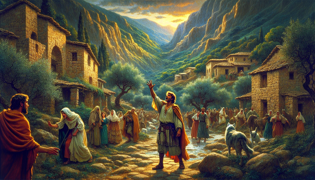
When Shadows Became Reality
Days turned into weeks, and every false alarm chipped away at the trust between Nikolas and his people. Morning light that once fostered playful exaggerations now seemed dimmer with each passing cry of 'Wolf!' Until one fateful afternoon when the sky took on a foreboding cast of iron-gray. The air sharpened into an almost tangible tension as a low, guttural growl resonated among the ancient olive trees. This was not the echo of childish mirth—it was the visceral sound of danger breathed into life.
The villagers, their faces lined with the hardened memories of past warnings, gathered hesitantly in the square. Their eyes, once brimming with faith in the shepherd’s words, now darted nervously over the horizon, calculating the possibility of true peril. With heavy hearts and measured steps, they prepared for battle, bridging the gap between age-old legends and the raw terror that now punctuated the moment.
Nikolas’s heart hammered in his chest as he repeated his cry, "Wolf! A wolf is coming!" But this time, his voice quavered with an unfamiliar whisper of dread. Every syllable fell on ears numbed by prior deceit. The once eager rush of villagers slowed to a murmur of doubtful shuffles, their eyes searching the gray skies and shrouded hills for signs of the imminent threat.
In the gathering gloom, nature itself seemed to conspire with the unfolding drama. A cold wind swept over the hills, scattering leaves like lost hopes while the distant rumble of thunder underscored the gravity of the moment. Then, out of the billowing mists at the forest’s edge, a silhouette emerged—a wolf, majestic and menacing, stepping into the clearing with eyes that gleamed like polished obsidian.
In that breathless instant, every doubt transformed into stark reality. The villagers’ caution turned to panic, and the truth of Nikolas’s lies became a painful paradox: the very cry that sought to warn now betrayed his credibility. Shock and fear intermingled with an overwhelming sense of regret, and as the wolf advanced under sporadic streaks of lightning, the ancient land bore witness to the tragic cost of broken trust.
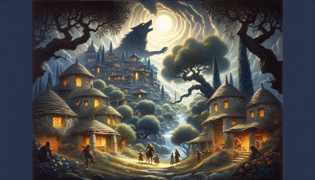
The Price of Deceit
In the wake of the wolf’s sudden appearance, the village was swallowed by a heavy hush, populated by hearts burdened with betrayal and caution. In the days that followed, every whispered conversation and every hushed glance bore the weight of Nikolas’s transgressions. What was once dismissed as a harmless prank had morphed into a stark lesson in the value of truth. The village square, usually alive with vibrant chatter and the vibrant interplay of daily life, now housed only the somber reminders of broken trust.
In this once-cheerful mosaic of life, a distinct separation grew between the shepherd and his people. Parents tried, in soft and measured tones, to explain to their curious children that words, like seeds, could either nurture life or sow devastation. And amid the subdued murmurs of regret, the village elder—a venerable man whose eyes mirrored centuries of wisdom—approached Nikolas. Clad in a time-worn robe and bearing the quiet dignity of age, he recounted venerable tales that had survived the ravages of time. With tender reproach, the elder reminded the boy that every lie, no matter how small, unravelled the delicate fabric of communal trust.
"To speak truth," he intoned gravely, "is to honor the divine order of our land. Each tale you spin has the power to create or destroy the bonds that bind us together." His words descended upon Nikolas like a soft but unyielding rain, each syllable etching a permanent mark of remorse upon his conscience.
The village itself seemed to echo this sentiment. Weathered facades of stone cottages, olive groves heavy with the scent of twilight, and even the gentle hum of a receding breeze bore silent witness to the pain wrought by deceit. Nikolas’s mischief had not only endangered the physical safety of his community but had also fractured an ancient covenant of honesty—a covenant as enduring as the myths that cradled this storied land.
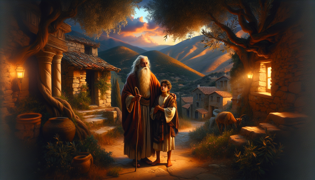
Embracing Redemption
Haunted by the deep remorse of his repeated deceit, Nikolas resolved to reclaim not only the trust of his people but also the dignity of his own heart. With the first rays of a crisp, hopeful dawn, he stepped away from the familiar paths of mischief and embarked on a solitary journey toward redemption. The landscape around him—ancient, rugged, and filled with quiet promise—seemed to whisper encouragement as he trod the winding paths along the slopes of Mount Parnassus. Tales of gods and heroes long past accompanied his every step, a living reminder that every soul could seek restoration through sincere change.
The trek was arduous, with rocky trails flanked by wild thyme and resilient olive trees standing as silent sentinels. Yet with every laborious step, Nikolas found a measure of healing. In a forgotten clearing crowned by towering cypresses and ruins that murmured stories of antiquity, he paused to reflect upon the magnitude of his errors. The soft murmur of a hidden stream and the rustling of ancient leaves served as a mantra urging him onward—a call to restore the frayed threads of his honor through genuine acts of service.
In the days that followed, Nikolas committed himself wholeheartedly to mending both physical and emotional wounds. He helped rebuild ancient stone walls that had crumbled in neglect, tended to the needs of his neighbors, and nurtured injured creatures in the wild. Slowly, as his heart opened to the demands of true responsibility, the community began to glimpse the authenticity in his efforts. Even the skeptical eyes of elders softened at small acts of kindness, each one a brushstroke in the renewal of an age-old covenant of trust.
This pilgrimage was more than a quest for forgiveness—it was a transformative journey toward self-realization. Every humble act, whether aiding a neighbor in the market or repairing a crumbling column outside the ancient temple, reawakened a long-dormant respect among the villagers. And as the crisp Mediterranean air carried away whispers of past misdeeds, a new chapter of hope took root among the olive groves and weathered stone. Although the scars of deceit had been indelibly marked upon his spirit, Nikolas now carried them as solemn testimony to the cost of falsehood and the redemptive power of truth.
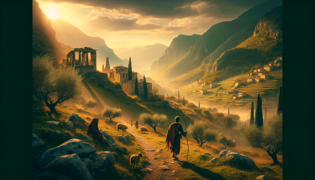
Conclusion
As dusk settled over the ancient hills, a gentle peace began to reclaim the worn faces and weary souls of the village. Nikolas, forever changed by the harsh lessons of his own deceit, stood in the quiet center of the community—the place where once his cries of false alarm had sowed mistrust. Now, under the soft glow of oil lamps and the slow cadence of night, his presence radiated with a hard-earned wisdom. The village elder, whose eyes had watched over countless seasons of joy and sorrow, recounted the day’s events in a measured, sorrowful tone. His words, rich with ancient lore and tempered by sorrow, reminded everyone that truth is the bedrock of unity and that even the smallest lie can scuttle the fragile beauty of trust.
In this new twilight, regret gave way to introspection. Nikolas listened as the elder spoke of heroes who had stumbled yet risen again—heroes who understood that redemption was not a swift remedy but a path fraught with challenges and small victories. The villagers, their hearts once embittered by deception, slowly allowed the spark of hope to glimmer in their eyes. Each whispered prayer and soft exchange over shared bread became a silent vow to rebuild what had been broken.
In that still, reflective moment, the shepherd boy recognized that his journey of redemption was far from complete. It was a lifelong endeavor to nurture honesty and foster trust. The gentle hum of night, the murmur of the cool breeze through ancient olive trees, and the distant clatter of cobblestone underfoot were all testaments to a community that had learned to forgive—and, more importantly, to remember. This cautionary fable, etched into the souls of those who had witnessed its unfolding, would whisper through generations the timeless truth: that while missteps in deceit can darken the brightest days, the radiant light of redemption and truth will always guide the way back to home.

















